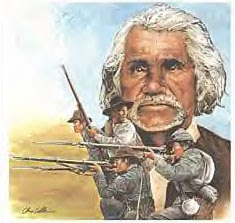JUNE 24, 1865:
The Editors of Harper’s Weekly publish an editorial, Our Duty In Reorganization, openly critical of President Johnson’s
“Restoration” plan and the disenfranchisement of Freedmen thereunder:
 |
| Generals Ulysses S. Grant and Winfield Scott meet again at war's end |
“Peace,” said Edmund
Burke, “may be made as unadvisedly as war. Nothing is so rash as fear, and the
counsels of pusillanimity very rarely put off, while they are always sure to
aggravate, the evils from which they would fly.” What this country needs to
secure peace is the firm application of a plain principle. The principle of
State rights, like that of country rights and town rights, is a good one. But
the principle of national rights is the paramount and essential principle of
the present situation. All subordinate rights whatever must bend to the
national necessity of a local government in every State based upon the consent
of the whole body of loyal freemen.
The national authority
is fully competent to secure that government. There is no reason whatever why
the nation should delegate its authority to secure such State governments in
the South to a part of the loyal freemen resident there. At this moment no one
loyal freeman of North Carolina has any right to a voice in reorganizing the
State which every other does not equally possess. There is no more reason,
except in an imaginary view of policy, why the national Government should
authorize white loyalists alone to reorganize the State government of North
Carolina because the voters in that State were formerly white than that it
should authorize the colored loyalists alone to reorganize it because they have
been always faithful to the country. As a question of policy merely, it is
clear that if any class of loyalists object to reorganize the State upon
acknowledged democratic republican principles that is not a class to which the
reorganization can be safely intrusted. It is better policy to govern the State
directly by the national authority than to relinquish it to such a class.
A
second editorial, Making Haste Slowly,
is likewise snidely critical of the uncertain path that Johnson seems to be
treading in regard to Reconstruction overall:
The President's reply to
the Committee from North Carolina, begging him to recognize that State as fully
restored to the Union, and to ask from Congress a repeal of the test-oath,
confirms what we said last week of his views in regard to the unorganized States.
The President replied
courteously that the North Carolina Legislature had not yet adopted the
constitutional amendment, which was an essential condition of restoration, and
he declined to answer specifically the other questions asked, saying only that
Governor Holden would continue to act as Provisional Governor until relieved
from Washington, and not by the result of the election ordered by the
Provisional Convention. In a word, said the President, “My action must depend
upon events.”
The Secretary of State,
by the President's order, has also informed Provisional Governor Perry of South
Carolina that he will learn from Washington when he is relieved,
notwithstanding the election of Mr. Orr; that the adoption of the emancipation
amendment “is deemed peculiarly important,” and that “it is impossible to
anticipate events.”
These things all show
that the measures adopted by the President are experimental. He is testing the
condition of the unorganized States. He is ascertaining whether they faithfully
accept the situation. Therefore he can not anticipate events. While he sees
that South Carolina merely repeals the ordinance of secession, and does not
repudiate the rebel debt, and does not voluntarily adopt the amendment; while
he sees Georgia refuse to repudiate her rebel debt, notwithstanding his plain
instructions to Governor Johnson; while he sees Mississippi elect an unpardoned
rebel for Governor in place of a technical Unionist, and in North Carolina the
Union candidate defeated; while he sees every where in the Southern States an
animosity toward the freedmen which warns him and the country not to abandon
them to the mercy of State laws, the President very naturally says to Mr. Reid
of North Carolina that his action must depend upon events.
Meanwhile it is pleasant
to know that the policy of the President receives the unqualified support of
the remains of the late unfortunate Democratic party. Supported thus by his
opponents, as well as his friends. the era of good feeling must be at hand.









